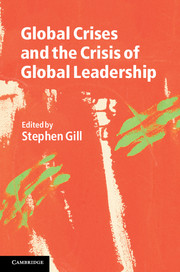Book contents
- Frontmatter
- Contents
- Contributors
- Acronyms
- Acknowledgements
- Introduction: global crises and the crisis of global leadership
- Part I Concepts of Global Leadership and Dominant Strategies
- Part II Changing Material Conditions of Existence and Global Leadership: Energy, Climate Change and Water
- Part III Global Leadership Ethics, Crises and Subaltern Forces
- 7 Global leadership, ethics and global health: the search for new paradigms
- 8 Global leadership and the Islamic world: crisis, contention and challenge
- 9 Public and insurgent reason: adjudicatory leadership in a hyper-globalizing world
- Part IV Prospects for Alternative Forms of Global Leadership
- Glossary
- Bibliography
- Index
8 - Global leadership and the Islamic world: crisis, contention and challenge
from Part III - Global Leadership Ethics, Crises and Subaltern Forces
Published online by Cambridge University Press: 05 June 2012
- Frontmatter
- Contents
- Contributors
- Acronyms
- Acknowledgements
- Introduction: global crises and the crisis of global leadership
- Part I Concepts of Global Leadership and Dominant Strategies
- Part II Changing Material Conditions of Existence and Global Leadership: Energy, Climate Change and Water
- Part III Global Leadership Ethics, Crises and Subaltern Forces
- 7 Global leadership, ethics and global health: the search for new paradigms
- 8 Global leadership and the Islamic world: crisis, contention and challenge
- 9 Public and insurgent reason: adjudicatory leadership in a hyper-globalizing world
- Part IV Prospects for Alternative Forms of Global Leadership
- Glossary
- Bibliography
- Index
Summary
Summary
Hegemonic, Orientalist frames of capture and understanding present Islamic models of restructuring social and cultural life as pathologies of alterity or as failures on the part of those living in what I call Islamic cultural zones (ICZs) to fully absorb modernity and its cognitive attributes. Such ‘zones’ include large regions that may span more than one nation, as well as areas within particular nations. The term refers to those parts of the world, particularly in urban centres, in which Islamic culture is most prevalent, such as across much of the Middle East and north Africa. In Orientalist discourse, this tends to render specific forms of political contestation that emanate from such Islamic cultural areas over ethics and questions of justice and dignity as mere representations of a ‘clash of civilizations’ on a world scale. Silenced in received hegemonic narratives is the deeply political nature of struggles over justice within such zones – to redesign political economy, reshape political community and place ethical constraints on market fundamentalism. In essence, these struggles exemplify efforts to re-imagine legitimate governance, responsibility and leadership. To be sure, global leadership provides the wider context of these struggles. This chapter interprets some contemporary political struggles in such zones against the backdrop of Islamic conceptions of justice as a commentary on the global political economy, focusing particularly on the ethico-political assumptions of ‘disciplinary neoliberalism’. The principal aim here is twofold: (1) to reinterpret Islamic ethics – encoded in cultural or religious idiom – as both a critique of, and an alternative to, the hegemonic settlement under globalizing conditions; and (2) to draw out the implications of the Islamic critique and alternative for re-imagining global leadership.
Introduction
Critiques of ‘disciplinary neoliberalism’ (Gill 1995a) have assumed heterodox forms. In some cases, they are encoded in the language of environmentalism, indigeneity, authenticity or religious resurgence. In others, they depend on the political language of resistance to globalization. However, in all instances, critiques meld moral and political disquiet. This disquiet is impregnated in and through political struggles. Critique exemplifies these struggles. The moral tenor residing in critique tends to disguise the contested nature of social existence and its growing incorporation into globalization. In this vein, local instantiations of critique are rarely localized; they have the potential to reveal the contours of an increasingly globalized social reality and its discontents (Mittelman 2000).
- Type
- Chapter
- Information
- Global Crises and the Crisis of Global Leadership , pp. 144 - 160Publisher: Cambridge University PressPrint publication year: 2011



